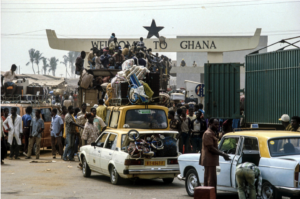
Ghana Must Go – A Review and Some History

Ghana Must Go was a historical event. But Ghana Must Go by Taiye Selasi is the story of a family.
The two share many similarities, not the least of which is that the historical event, the effects of the 1983 expulsion of Ghanaians from Nigeria on the father in this story. Both the event and the story involve African people living away from their families’ origins. Both involve a return to family. And both the event and the story required a journey “home”.
The story is set in motion when the Sai family’s father dies alone in Accra in a house with his second wife. He had been a successful surgeon in America… until he wasn’t. And his fall from grace led him to abandon his family in Boston and return to Ghana.
It was not his first flight from a foreign land; the father had been caught up in the 1983 expulsion from Nigeria as well.
Eventually the family’s mother, ethnically Nigerian, would return to Accra as well; leaving her children behind spread across the United States and in London. Although the family’s mother is Nigerian, her mental memories do not include the 1969 expulsion of Nigerians from Ghana.
The children – oldest son who is unable to fully commit to his Chinese-American wife, middle twins who were one person until horrible events ripped them apart in early adolescence, and the youngest girl who felt she could never measure up to her successful siblings and tried to exert control over her world by vomiting everything she ate – come together again in Ghana to deal with the death of their father. Not just to deal with the death, but to deal with the effect his life exerted over them all, as well.
The book is littered with the cultural understanding of people who live between two worlds, the mix of one and the other that help a person to fit in everywhere, but also nowhere.
“Your baby is crying,” says the driver to Taiwo, the Ghanaian way of saying your cell phone is ringing.
Someone of both worlds knows this, just as they would have most likely have instinctually turned their ringer off entirely while hurtling around in a Massachusetts Uber.

From the 1930s Nigerian immigrants flooded to Ghana in search of a piece of the prosperity that Ghana was experiencing. They worked in service jobs and on the cocoa plantations and they took up merchant positions in the local markets.
This worked well for everyone, particularly under the Pan-Africanism advocated by Kwame Nkrumah. Nigerians continued to flood into Ghana.
But when the bottom began to drop out of the cocoa market, the more intense troubles began. Ghanaians, with rising unemployment, felt entitled to the jobs held by Nigerians. Further, they viewed the conspicuous consumption of Nigerian merchants as a slap in the face and rumors began to circulate that their success was caused by sorcery.
These issues led to the 18 November 1969 Aliens Compliance Order which gave Nigerian immigrants in Ghana two weeks to leave the country.
In the 1970s the tables turned and Ghanaians were flooding into Nigeria in order to take advantage of the jobs created by the oil boom. Unfortunately, the boom leveled off and it was Nigeria’s turn to deal with unemployment and unrest, and they did so as Ghana had done before them: by expelling the outsiders.
Over a million Ghanaians flooded out of Nigeria, through Togo and Benin, to be confronted by Ghana’s closed borders. Refugees camped out while waiting for boats from Cotonou to Ghana, until finally the borders opened and Ghanaians swarmed home.

There would be further expulsions from Nigeria in 1985, when the military leader (and now President of Nigeria) Muhammadu Buhari expelled even those foreigners with legal residency. The symbol from that time is still prominent today; the hard-wearing plastic bag, cheap and used to transport items across town and across the world. In Africa, it is known as the Ghana Must Go bag.

For more on African history, please click here.
For more book reviews, please click here.
- February 5, 2021
- Review
